When it comes to horse trekking in Kyrgyzstan most travellers tend to make a beeline for Song Kol. This is one of the best-known routes in the country and it’s the same route I took on my first trip to Kyrgyzstan.
Song Kol is as beautiful as can be and reaching the lakeside camp around sunset is about as postcard-perfect as it gets, but coming back to Kyrgyzstan for our second trip, Sam and I were looking to veer off the trodden trail and maybe try something new.
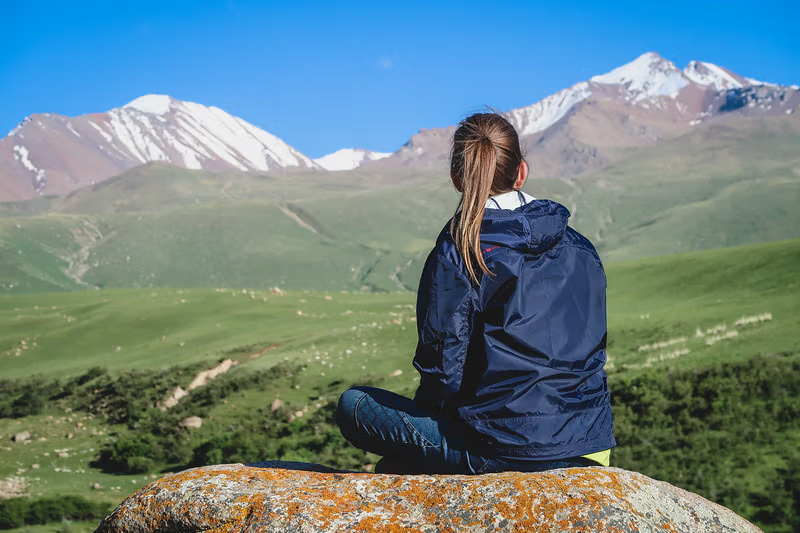
Luckily for us, in the past year, the tourism board has been developing a whole bunch of new trekking routes along Issyk-Kul’s south shore so we got to be one of the first travellers testing out one of the trails!
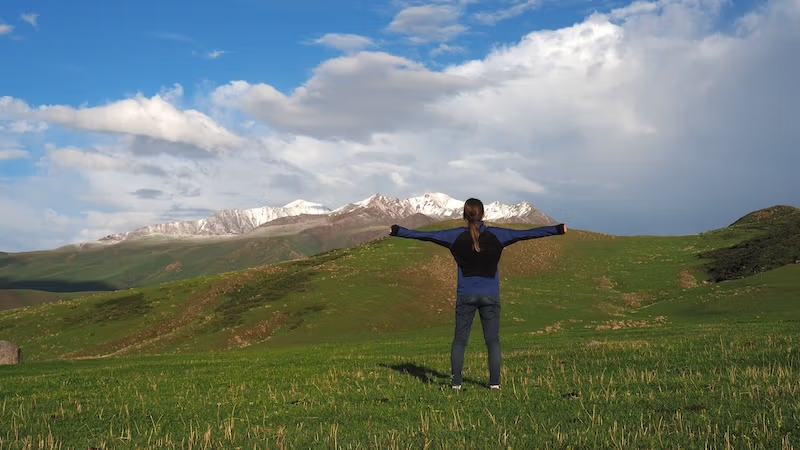
We ended up doing a 3-day horse trek along the Panorama Trail, which starts and ends in Bokonbayevo doing a big loop through the valley. Physically, it was a challenging 3 days that involved a mix of horse trekking and hiking, but it was also a rewarding 3 days where we shared meals with our host families, picnicked by alpine lakes, befriended the sweetest Kyrgyz hunting dog, came face to face with ancient petroglyphs, and saw the hard work that goes into being a shepherd in the summer pastures.
Here’s a recap of that adventure:
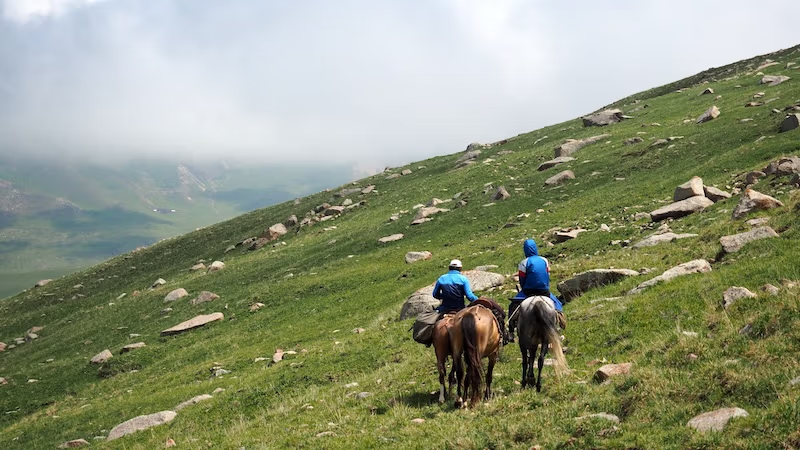
Kyrgyzstan Horse Trekking Guide: Adventure At Its Best!
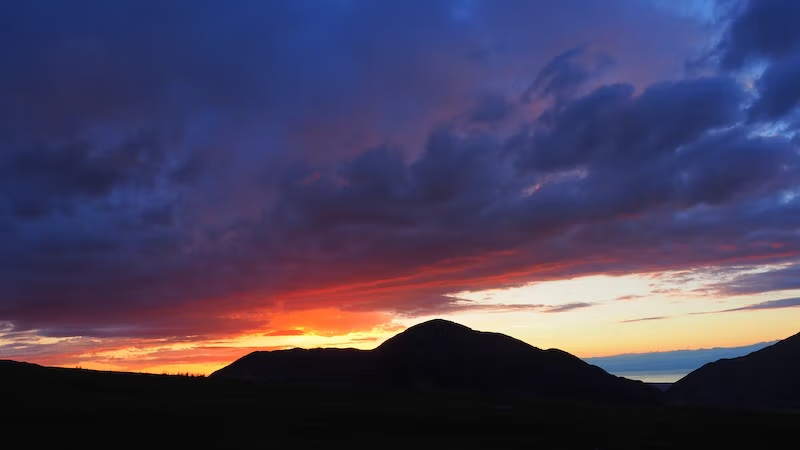
Day 1:
Riding to the jailoo, a crazy hail storm, and a light hike.
Our tour started at 9 in the morning when we were met by our guide who came to pick us up from our guesthouse in Bokonbayevo. He already had the horses saddled up and ready to go, so after saying goodbye to our host for a few days, we hopped on the horses and started the journey out of town.
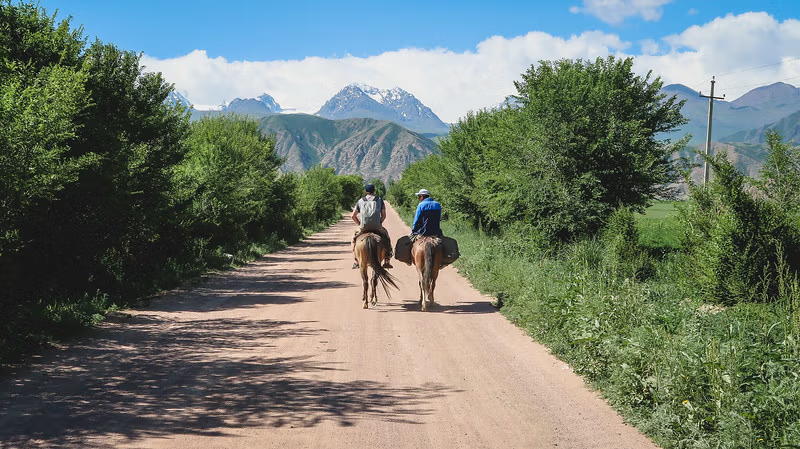
This was a very easy day of riding with most of the terrain being relatively flat. We briefly rode through a residential area as we manoeuvred our way out of town, but it wasn’t long before the landscape gave way to pink fields in bloom and mountains off in the horizon.
We rode a total of 4 hours that morning reaching camp right around lunchtime, and let me tell you, we were ready for food!
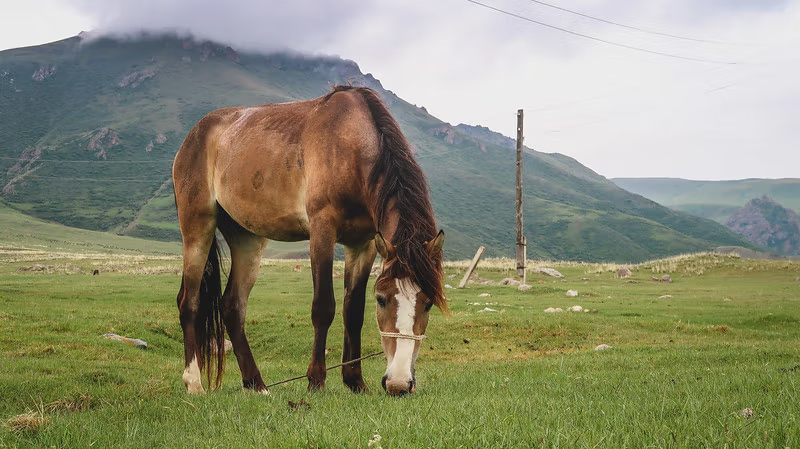
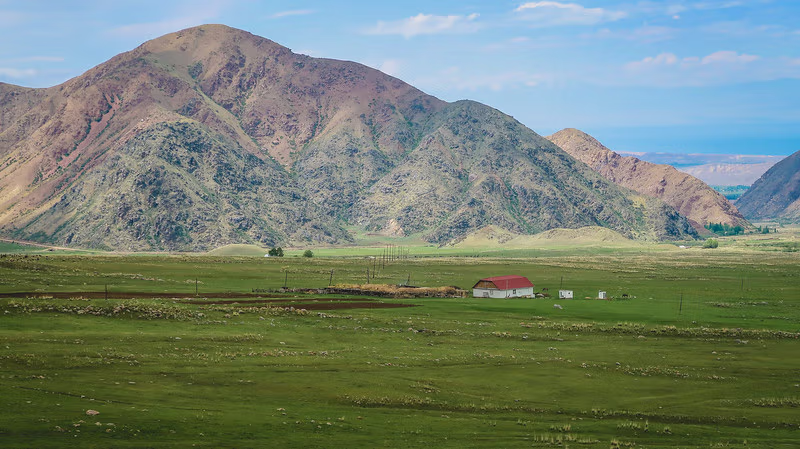
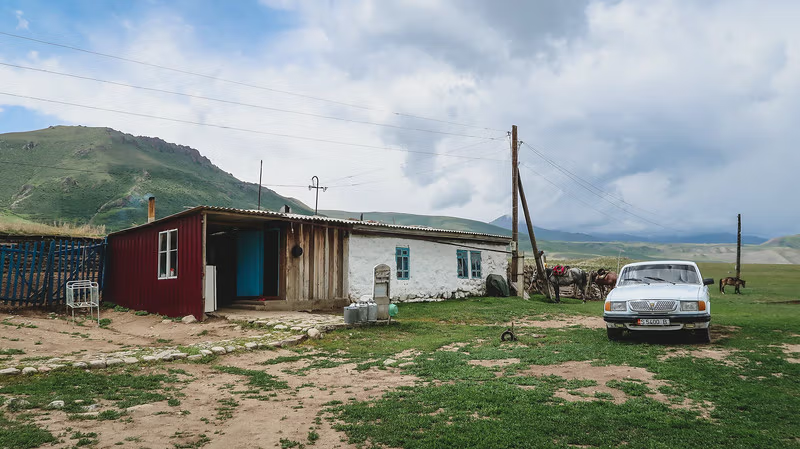
Our host family had a large plot of land in the valley consisting of one modern two-story home and an older traditional stone house where they had the kitchen and ate their meals.
Feeling famished from a day of riding, we sat down at the table where we had a typical Kyrgyz food spread consisting of fried bread known as borsok, fresh-churned cream, raspberry jam, biscuits, fresh apricots, and non-stop cups of tea; the Kyrgyz are renowned for their hospitality and they’ll ensure your cup of tea is never empty!
Shortly after lunch, a hail storm unleashed above us, so we retreated to the yurt for cover. From the intensity of the thundering and lightning, I was expecting rain for the rest of the day, but the storm passed as quickly as it arrived. Within a half-hour, the skies had cleared, the rain had stopped, and we just had a bit of hail left on the ground as evidence.
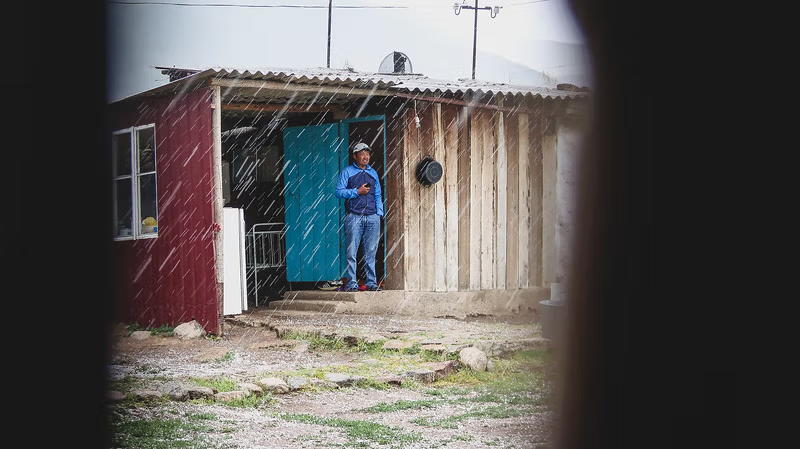
With the storm past us, our guide suggested an afternoon hike, so we walked up one of the hills for views of snow-capped mountains off in the distance. It was on this hike, that we also befriended the cutest Kyrgyz hunting dog who would become our companion for the rest of the trip! He was happy to tag along with us, take a detour or two when he spotted some prey, and then rejoin our trio for pets and ear scratches.
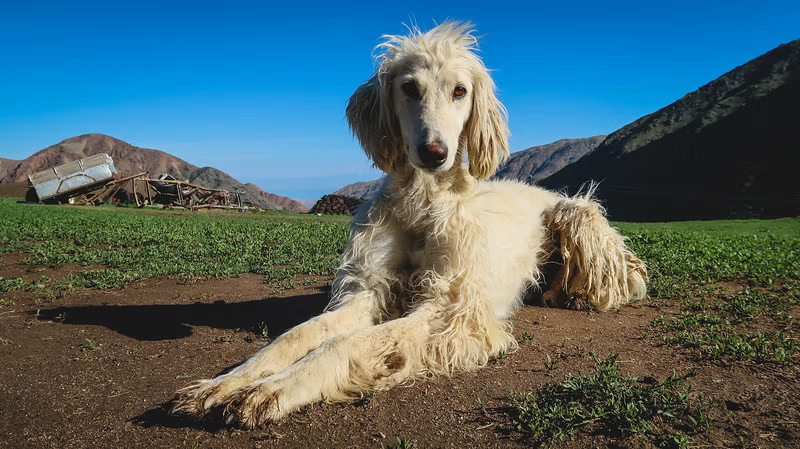
That evening we had dinner with the family. The wood-burning stove had warmed up the entire kitchen, so it was very toasty despite the low temperatures outside. We all sat down around the table, where we enjoyed heaping bowls of plov; a mixed-rice dish with carrots and beef.
Since it was already dark out but still too early to go to bed, we sat around in the kitchen watching a kok-boru match on their television. This is a popular game across Central Asia, often compared to polo, except instead of using a ball, players are trying to score with a sheep or goat’s carcass! This brought back some memories from the World Nomad Games where I first watched the game.
Day 2:
Steep inclines, an idyllic picnic, and the best views!
After a hearty breakfast of fried eggs, bread with cream and jam, and many cups of piping hot chai, it was time to say goodbye to our host family. We took lots of photos together on their smartphones (because rural living doesn’t mean you have to be disconnected!), and then it was back on the horses to continue the journey with our new dog friend in tow.
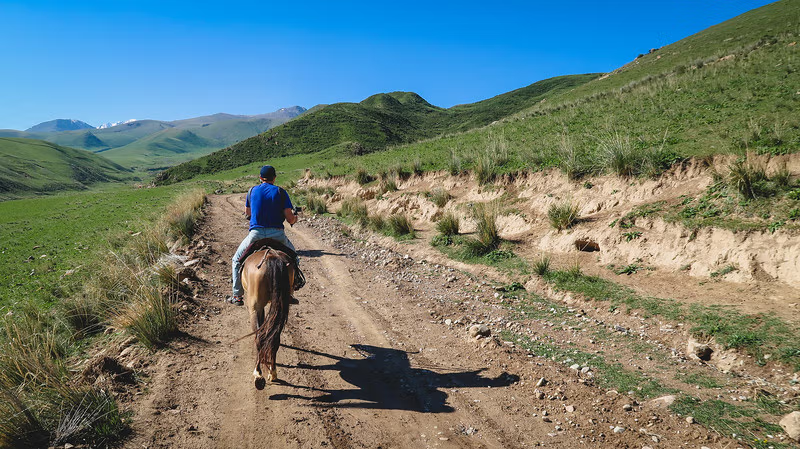
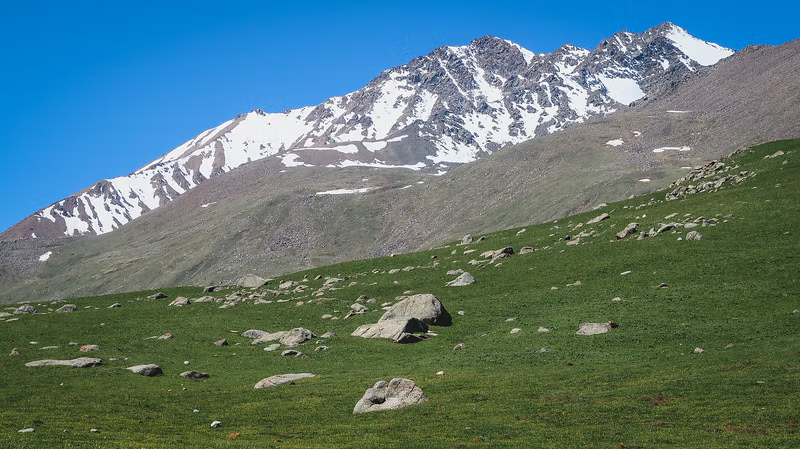
This was the hardest day of riding since it involved some steep inclines, but it was also the most beautiful day of riding bringing us ever closer to the snowy mountain peaks. The highest pass was 3,080 meters, but don’t let that scare you off; just be prepared to take it slow with lots of zig-zagging up the face of the mountain.
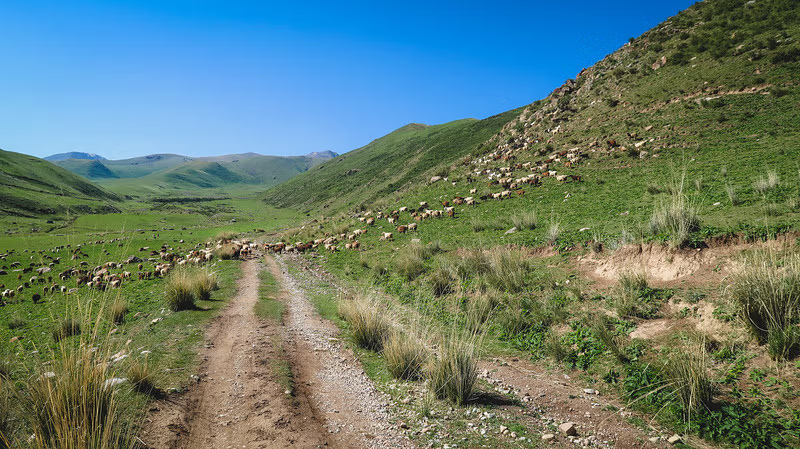
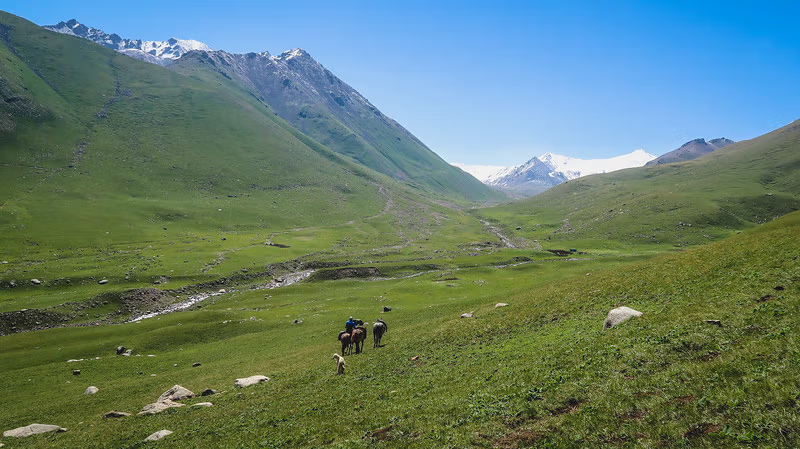
Also, lunch that day was about as scenic as it gets. We rode to a small alpine lake at the very top of one of the mountain passes where our guide laid out a picnic for us to share. Our meal consisted of loaves of bread, smoked cheese, sausage, juice, peanuts, dried apricots, bananas, chocolate bars, and more snacks than I can remember.
The whole experience was rather mystical because we had this thick fog rolling over us, so there were moments we were shrouded by a veil of grey, but then it would part and we’d get a glimpse of the scenery in front of us. It was one of the coolest picnic locations ever!
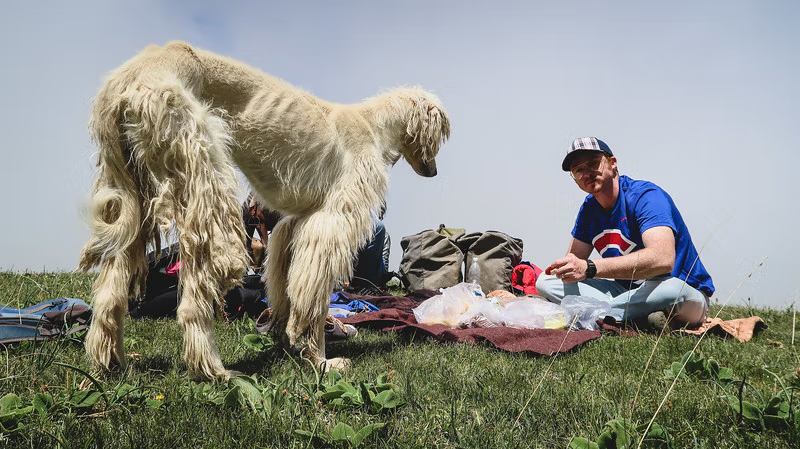
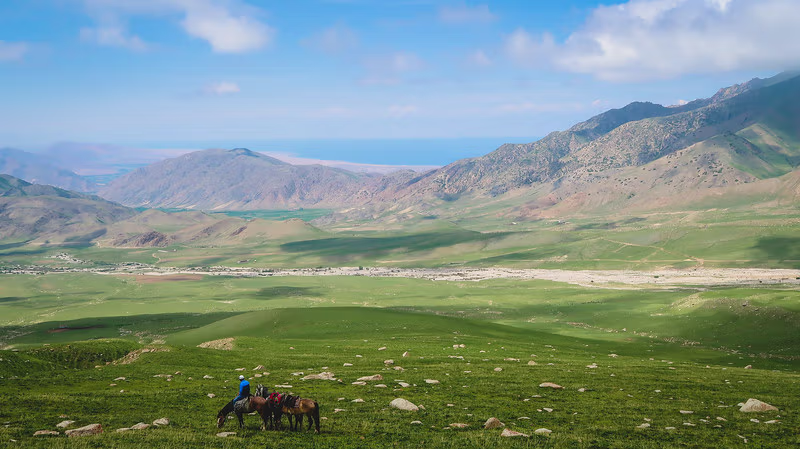
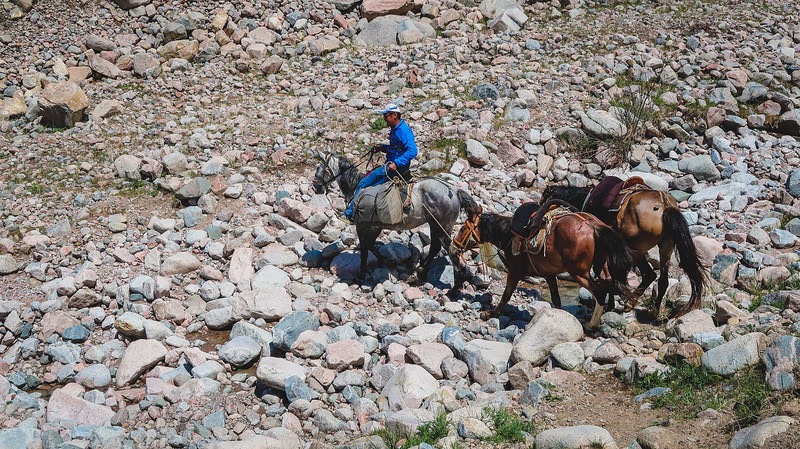
The afternoon trek was a bit challenging; now that we had gained all that altitude, we needed to come down the back face of the mountain. There were parts that I did on horseback, and other parts where I hopped off and hiked instead – if you’re not an experienced rider or your knees can’t handle going downhill, this is always an option.
It was a slow descent and I had to slide down on my rear on a couple of tricky sections, but in the end, we managed. I think we were all pretty thrilled to reach our camp – our guide included!
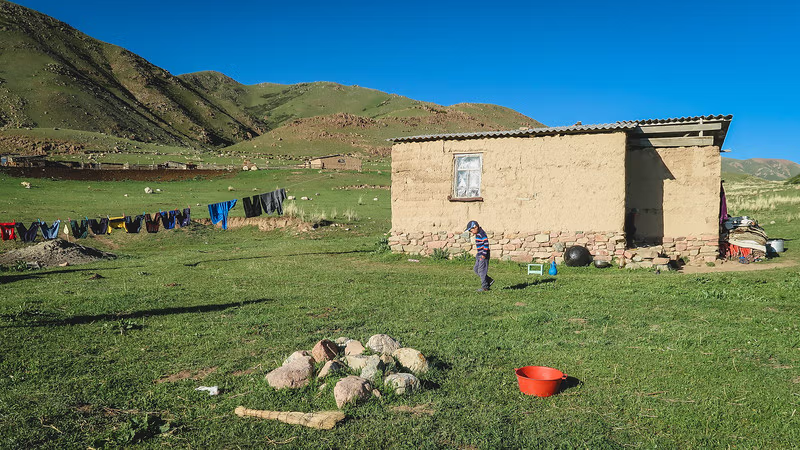
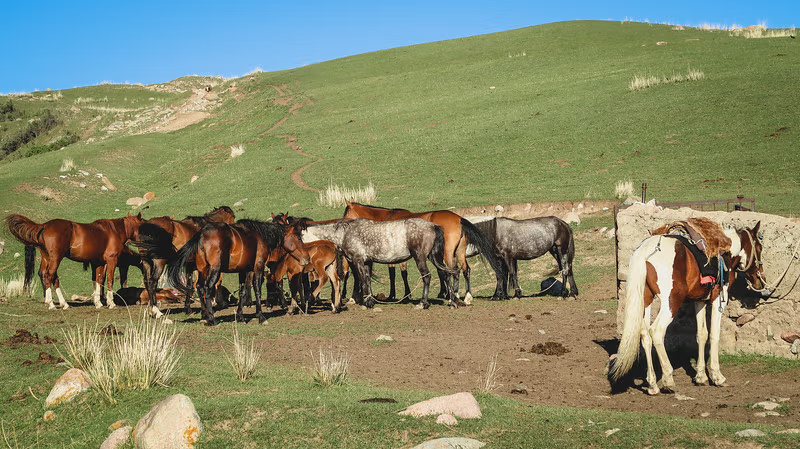
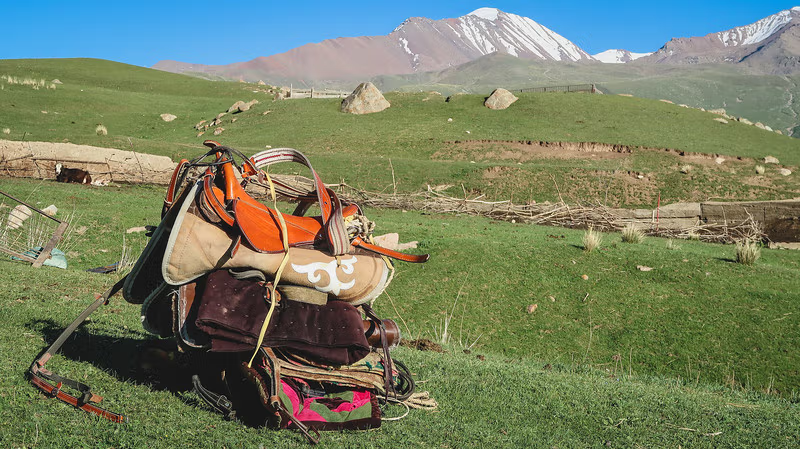
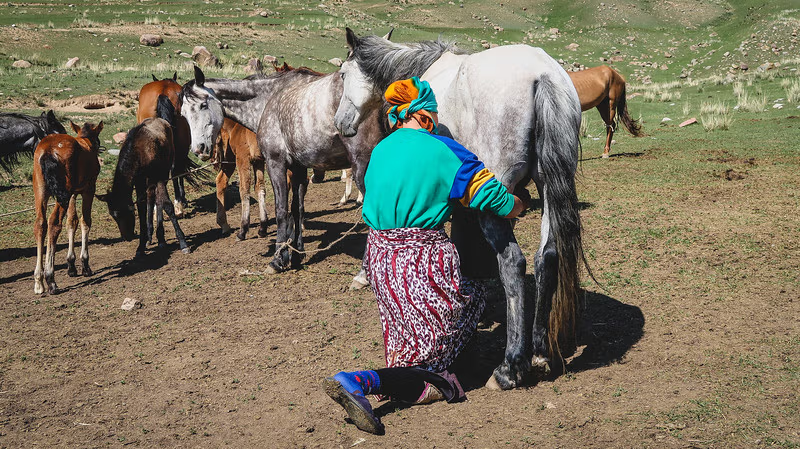
That night we stayed with a shepherding family in their summer home. It was a simple 2-room structure made of stone, mud and straw. The first room as soon as you entered the house was a dining area and kitchen; here they had a wood-burning stove, a low table, and a few mats for people to sit on. The other room was the family bedroom, which looked empty by day, but this is where they rolled the mats and blankets out at night.
I will admit that this was unlike any homestay I’ve ever done in the past and at first I felt a bit out of my comfort zone. In total, we slept 11 people to one room all lined up next to each other on the floor, but at the same time, everyone welcomed us so warmly and they were willing to share everything they had with us, that we couldn’t help but feel humbled by their generosity.
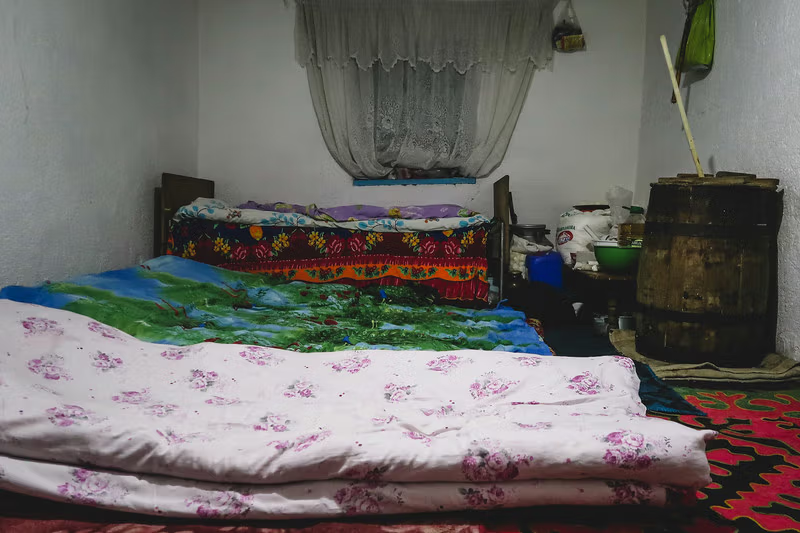
Without distractions like Wi-Fi, television, or books to pass time, we spent the afternoon watching the family herd their 700+ sheep and get them back into their corral for the night. We then had a dinner of oromo; a steamed layered dough filled with carrots, cabbage and potato, and then it was time for bed.
That night I fell asleep to the sounds of the family’s cooing baby, soft snoring, and the smell of fermented mare’s milk in the air.
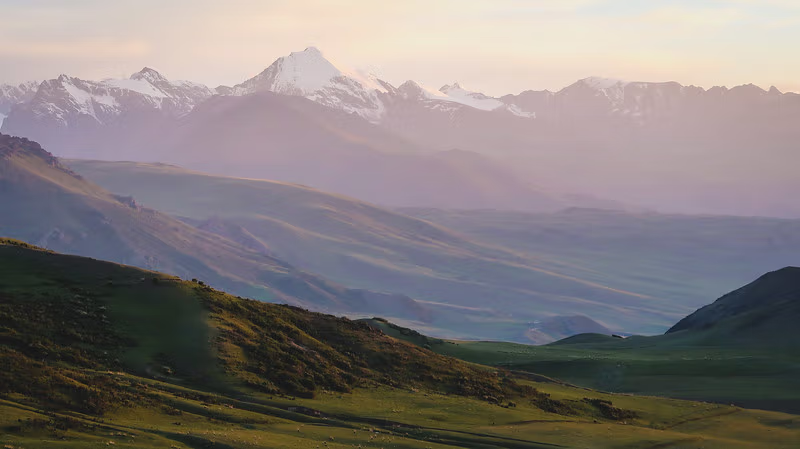
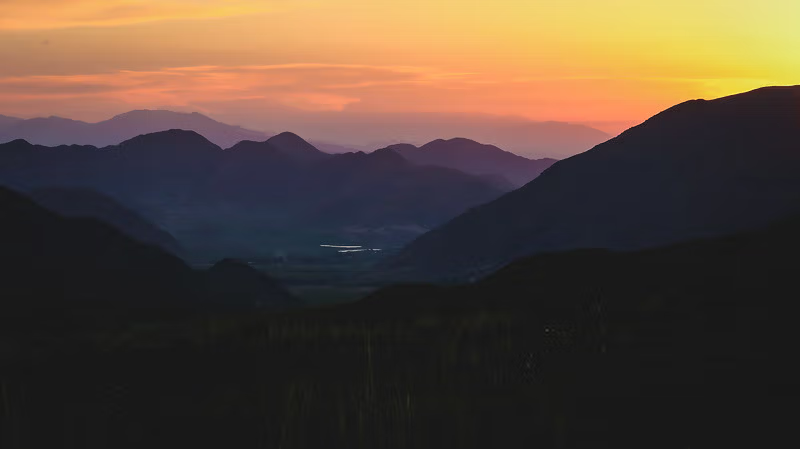
Day 3:
Ancient petroglyphs, easy riding, and a farewell.
The following morning I woke up feeling refreshed by some of the best sleep of my life, but I guess fresh mountain air and some heavy blankets will do that to you.
For breakfast, we had white semolina porridge, bread with jam, and many cups of chai, and then again, it was time to say goodbye to our host family and hop on our horses.
This turned out to be a really easy day of riding, starting out with a slight downhill incline, before levelling out into flat terrain.
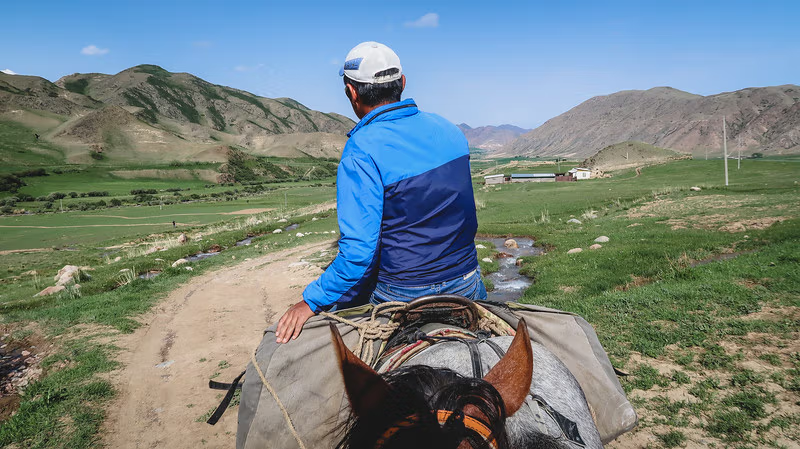
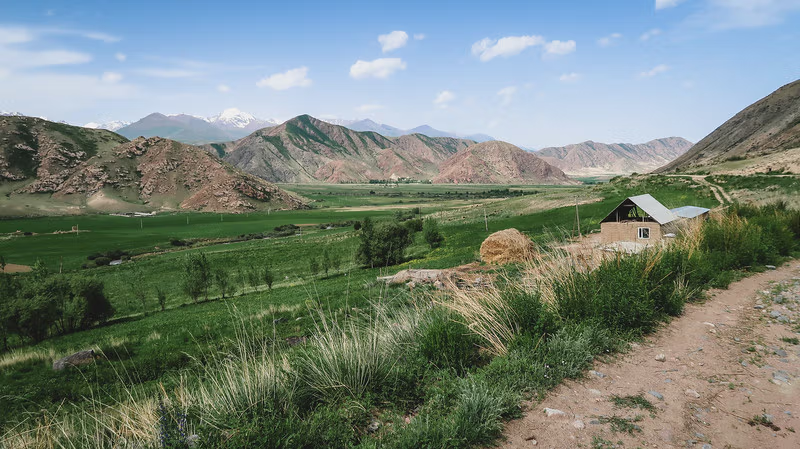
Halfway through the morning, we stopped off at a field that had giant boulders with petroglyphs. We were able to spot a camel, a mountain goat, and a man on horseback, who our guide claimed was Marco Polo himself. How cool is that? The petroglyphs were hiding in plain sight making history feel so palpable.
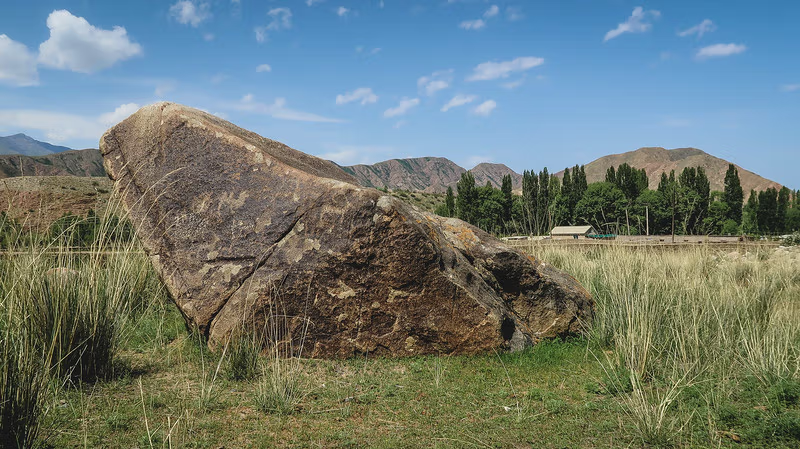
After visiting the petroglyphs, we had another picnic lunch. It was another generous spread consisting of flatbread, sausage, canned fish, biscuits, juice, nuts, raisins and more. Of course, we also fed our dear Kyrgyz hunting dog who was still with us on day 3. Our guide actually had to approach some locals to find out who owned the dog, and then leave him in someone’s yard to be picked up by his owner because otherwise, the dog would have walked with us all the way back into Bokonbayevo. It was bittersweet parting with the pup, who had earned the name Dog Friend, but he had a home and we were moving on.
After 3 days up in the mountains, it felt a bit strange arriving back in town. Even though Bokonbayevo has a population of just over 10,ooo people, it still felt very busy!
Back in town, we returned to our guesthouse, picked up our luggage, and hopped in a taxi to Bel Tam, where we would spend the next 3 days doing a lakeside yurt stay, but that’s another story for another blog post.
Planning your trek from Bokonbayevo
You can start planning your trip by visiting Feel Nomad. They offer numerous tours in Kyrgyzstan and you can either choose from their existing itineraries or customize your own if you’re looking for something slightly different
Aside from that, you can also visit Destination South Shore or CBT Kyrgyzstan (Community Based Tourism Kyrgyzstan) which has offices across the country, including the town of Bokonbayevo.
They can offer help when it comes to arranging everything from drivers and homestays to horse treks and day hikes. They speak English in their offices and they can offer suggestions on lesser-known routes. You can have a look at some of the treks along the South Shore here.
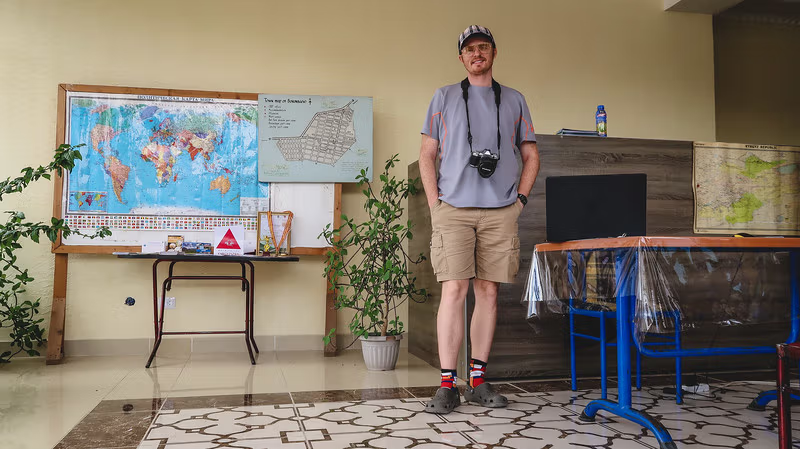
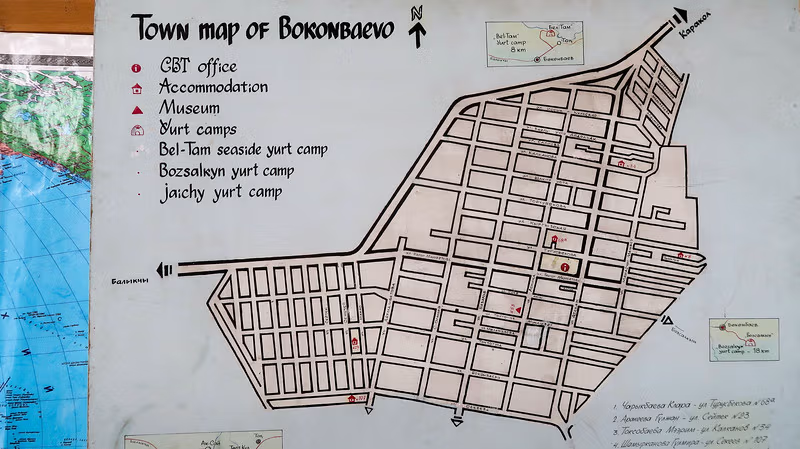
A few tips for trekking in Kyrgyzstan
- Pack for all kinds of weather. Over the course of our 3-day trek, we had sunshine and overcast skies, hail storms and light rains. You could experience all of the above in one single day, so go for light and breathable layers that you can easily add and take off. Also, always have a rain-jacket on hand.
- Protect yourself from the sun. Needless to say, the sun is a scorcher at high altitudes, so you’ll want to bring sunscreen and apply it more frequently than you normally would.
- Drink lots of water. On that note, it’s also important you stay hydrated. We brought two bottles each and always finished them by mid-afternoon. Your guide will usually also be carrying extra water, but re-confirm that before you set out on your trek.
- Wear the right shoes. Go for something sturdy that provides arch and ankle support. I did not pack the right shoes on this trip and regretted it. Hiking boots are ideal but at the very least a good pair of running shoes with tread.
- Bring your bathroom essentials. That means toilet paper, baby wipes (no chance of a shower), and hand sanitizer.
- Keep a flashlight handy. You’ll need it at night to find your way to the outhouse.
- Choose what’s right for you. There are all kinds of treks in Kyrgyzstan in varying lengths and levels of difficulty. Some treks involve homestays, some yurt stays, and others camping in tents. Some treks are 2 weeks in length and others are only a half-day. Ask for information at the CBT offices so you know what you’re getting yourself into and then make an informed decision. You can find a few more tips for travel in Kyrgyzstan here.
Also, here’s a video from our 3-day horse trek so you can get a better idea of that trip:
Plan Your Trail Adventure: Everything You Need to Know Before You Saddle Up
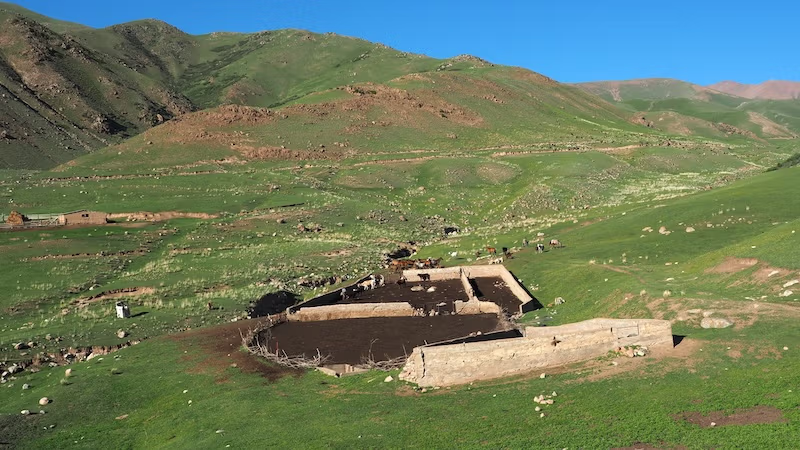
Panorama Trail at a Glance
- Region: South shore of Issyk-Kul, loop starting/ending in Bokonbayevo
- Duration: 3 days / 2 nights (expandable to 4–5 days with side valleys)
- Highest pass: ~3,080 m (10,105 ft)
- Daily saddle time: 3.5–6 hours (mix of riding + short hikes on steeper downhills)
- Terrain: River valleys, alpine meadows (jailoo), rocky passes, occasional scree
- Overnights: Family homestay (night 1), shepherd summer pasture stay (night 2)
- Best months: Late June–September (see season notes below)
- Booking: CBT Kyrgyzstan, Destination South Shore, or a local operator/guide
- Who it suits: Active travelers comfortable with basic riding or willing to learn; families with older kids also do this with a private guide
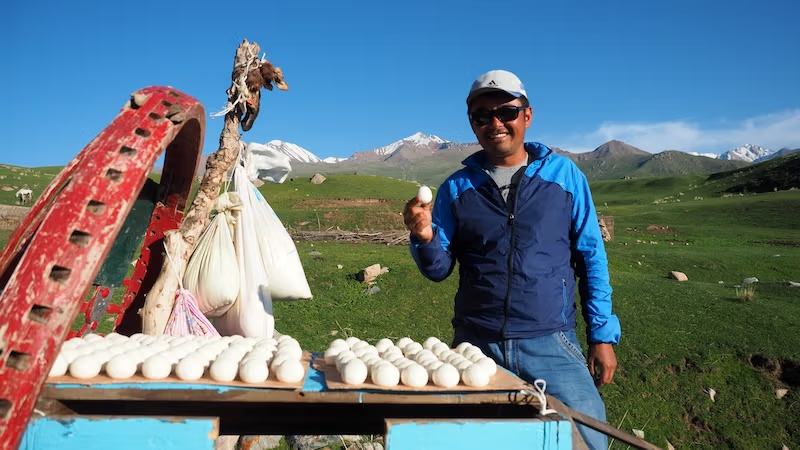
Song-Kol vs. Panorama Trail (Which Trek Fits You?)
If you’re torn between the classic Song-Kol ride and this more off-the-radar Panorama Trail, here’s a friendly comparison from the saddle:
| Feature | Song-Kol | Panorama Trail (Bokonbayevo loop) |
|---|---|---|
| Crowd level | Popular; more riders & yurt camps in peak season | Quieter; we met hardly anyone beyond locals |
| Scenery style | Big, mesmerizing lake plateau & wide open jailoo | Deep valleys, rocky passes, alpine lakes, desert-to-alpine contrasts |
| Overnights | Primarily yurt camps around the lake | Family homestays & shepherd huts, occasional yurt |
| Riding difficulty | Moderate; long days but gentler gradients | Moderate–challenging; one steep pass with optional dismount/hike |
| Cultural immersion | Camp-to-camp social vibe with other travelers | One-on-one with host families; very local daily life |
| Logistics | Streamlined & well-trodden | Newly developed; best arranged with CBT/local guide |
| Add-ons | Naryn, Tash Rabat | Bel-Tam yurt stay, Skazka (Fairy-Tale Canyon), eagle-hunting demos |
Bottom line: If you want iconic lake vistas and a social yurt scene, ride Song-Kol. If you crave solitude, varied terrain, and intimate homestays, pick the Panorama Trail.
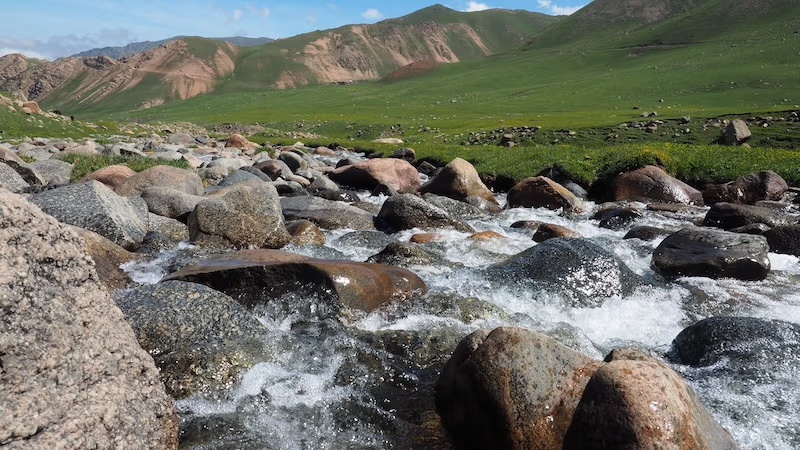
When to Go (Season by Season)
Spring (May–mid-June)
Wildflowers and snow-capped drama. Lower valleys rideable; high passes can still hold snow and some streams run high. Expect four seasons in a day.
Summer (late June–August)
Prime trekking. Warm days, cool nights, high passes open, shepherd families up on the jailoo. Afternoon cloudbursts happen—pack rain gear.
Early Autumn (September)
Golden grass, crisp air, clear light for photos. Nights get cold at altitude; some families descend from the high pastures by late September.
Winter (Oct–April)
Not recommended for this loop unless you’re equipped/experienced for winter expedition travel with a specialist guide.
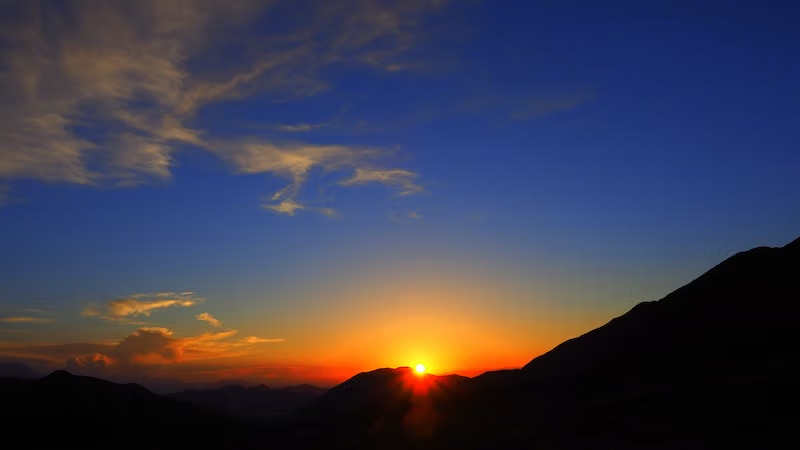
Difficulty, Altitude & Pacing
- Max altitude hovers around 3,080 m. Most riders feel fine with a sensible pace.
- Acclimatization: Spend a day or two around Bokonbayevo/Balykchy (1,600–1,700 m) before riding.
- Typical day: 3–6 hours in the saddle with snack/drink stops + an unrushed lunch picnic.
- Uphill vs. downhill: Uphills are slow zig-zags; for steeper, loose downhills, many riders dismount to hike 15–40 minutes to give knees and horse a break.
- Trail etiquette: Space your horses on switchbacks, announce if you’re dismounting, and never overtake on a narrow ledge.
Listen to your body: Headache, nausea or unusual fatigue? Tell your guide early, hydrate, slow down, and consider dropping elevation.
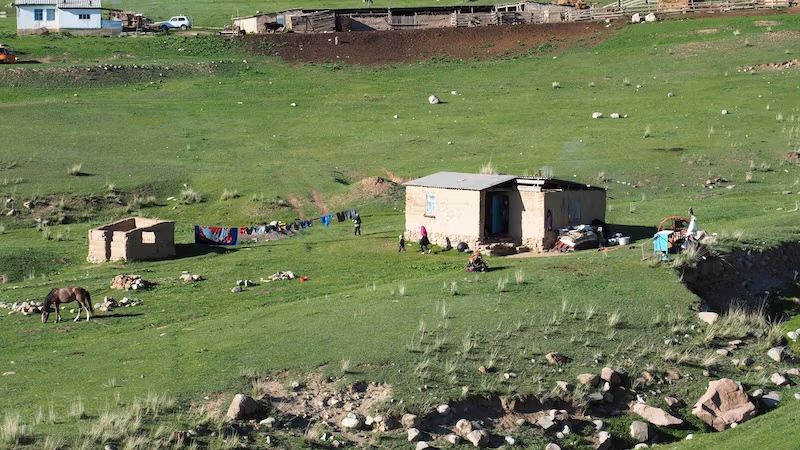
What to Pack for a 3-Day Horse Trek (Checklists!)
Pack for layers and surprises—the mountains love a mood swing. Keep it light; your horse and knees will thank you.
Clothing & Footwear
- Quick-dry base layers (1–2 tops, 1 set long johns for nights)
- Fleece or light insulated jacket
- Waterproof/windproof shell (hooded)
- Trekking pants + warm leggings (for camp/night)
- Riding-friendly footwear: stiff trail shoes or light hikers with grip (avoid bulky, wide soles)
- Warm hat + sun hat (wide brim or cap)
- Gloves (thin liner for riding; warm pair for chilly mornings)
- 3 pairs hiking socks + spare camp socks
- Buff/neck gaiter (dust, wind, sun)
Riding & Camp Essentials
- Headlamp (with spare batteries)
- Water bottles (carry 2L total; collapsible bladder okay if you prefer)
- Sunglasses (polarized if possible)
- Trekking poles (useful for steep descents)
- Compact daypack (15–20L) with rain cover
- Dry sacks or zip bags (organize + dust protection)
- Lightweight camp shoes/sandals (optional heaven)
- Travel towel (quick-dry)
Toiletries & Health
- High-SPF sunscreen + lip balm
- Baby wipes (no showers), small biodegradable soap
- Hand sanitizer + TP in a zip bag (for outhouse stops)
- Personal meds + mini first-aid (blister care, pain relief, rehydration salts, antihistamine)
- Water purification (tabs or filter) if you want independence
- Electrolyte tabs (altitude + heat days)
Tech & Documents
- Power bank (no outlets at shepherd stays)
- Phone/camera + spare memory battery
- Offline maps & translations downloaded
- Passport copy + small cash (KGS) for tips/snacks on travel days
- Travel insurance info (screenshot/paper backup)
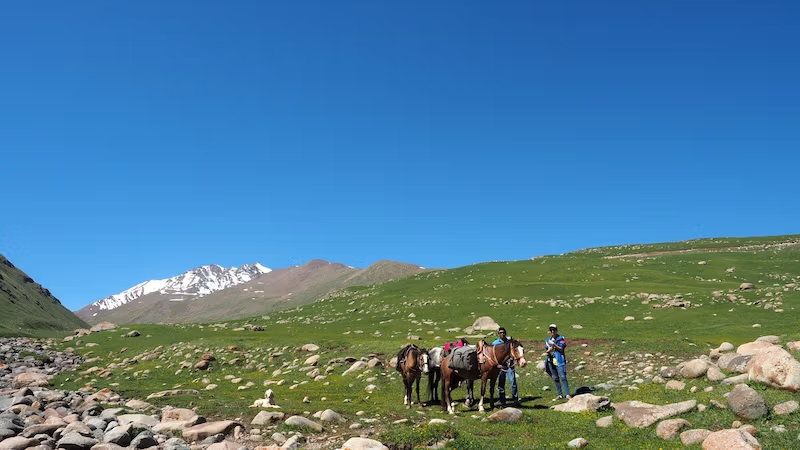
Homestay & Yurt Etiquette (How to Be a Great Guest)
- Tea is love: Accept the first cup; you can decline refills kindly (“Rakhmat” = thanks).
- Shoes off at the door; step onto the felt shyrdak rugs with socks or bare feet.
- Seating: Hosts often motion you to a place—take the hint and the hospitality.
- Photos: Always ask before photographing people or indoor spaces.
- Helping hands: Offer to clear dishes or pour tea; you’ll likely get waved off, but the gesture is appreciated.
- Gifts: Small items for kids (stickers, pencils), fresh fruit, or printed photos of a previous stay (if returning) go a long way.
- Modesty matters: Even in heat, bring a light layer for shoulders/legs inside homes.
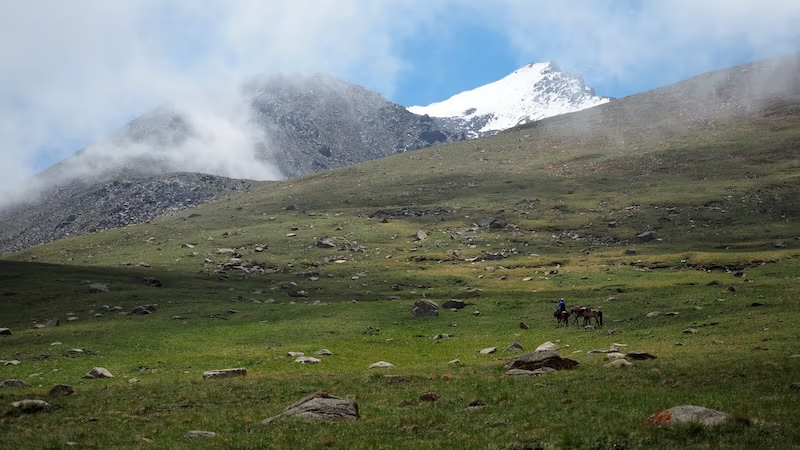
What Our 3 Days Looked Like
Day 1 — Bokonbayevo → Valley Homestay (4 hrs riding)
Flat and friendly introduction to the horses and terrain. Lunch on arrival (borsok, jams, cream), storm-watch from the yurt if the sky performs, short hill hike for a first mountain panorama. Dog friends optional (but likely).
Day 2 — Valley → High Pass → Shepherd’s Hut (5–6 hrs riding + hikes)
The big pass day: steady switchbacks, alpine lake picnic in moody fog, then careful descent (we hiked parts). Evening with a shepherd family—oromo for dinner, starry skies, and a memorable “11-to-a-room” mountain sleep.
Day 3 — Shepherd’s Hut → Petroglyph Field → Bokonbayevo (3–4 hrs riding)
Gentle return with flat valley tracks, ancient petroglyphs hidden in plain sight, a final picnic (share with your four-legged companion) and a bittersweet trot back to town.
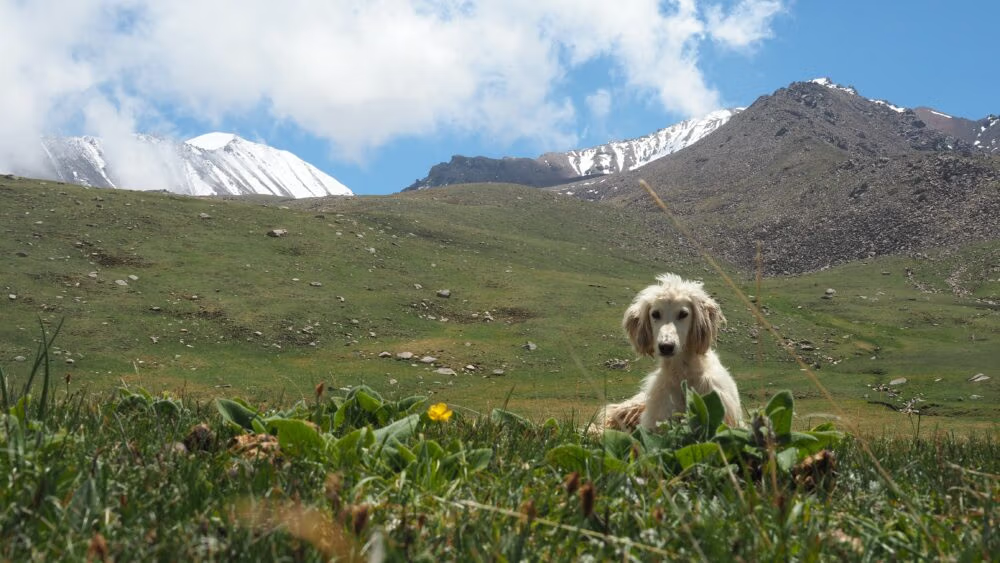
What Does It Cost? (Typical Booking Routes)
Prices vary with season, inclusions and group size; think in ranges and ask what’s included.
| Booking Style | What You Get | Indicative Cost (pp/day) | Good For |
|---|---|---|---|
| CBT / Destination South Shore | Local guide + horses, homestays, meals, route support | $$ (mid-range) | Culture-rich, flexible, supports community |
| Small local operator | Packaged trek incl. transfers, English-speaking guide | $$–$$$ | Hands-off planning, add-ons (eagle show, canyon) |
| Private guide (independent) | You + guide + horses; you arrange some meals/rooms | $–$$ | Budget-savvy, experienced travelers |
Ask clearly:
- Are meals included (3/day)?
- Who carries water/snacks?
- Are homestay payments/tips included or extra?
- What safety kit does the guide carry (radio/phone, first aid)?
Food on the Trail (What You’ll Eat & How to Adapt)
- Breakfasts: Eggs, bread + cream/jam, porridge, endless chai
- Lunches: Picnics—bread, cheese, sausage, fruit, nuts, chocolate, juice
- Dinners: Plov, laghman, oromo, soups; hearty and simple
Dietary tweaks:
- Vegetarian: Emphasize veg + carbs; ask for eggs, extra salad, beans (where available).
- Lactose-sensitive: Lots of dairy present; carry lactase tablets and communicate “no milk/cream”.
- Gluten-free: Harder in rural areas—pack backup snacks (nuts, jerky, dried fruit).
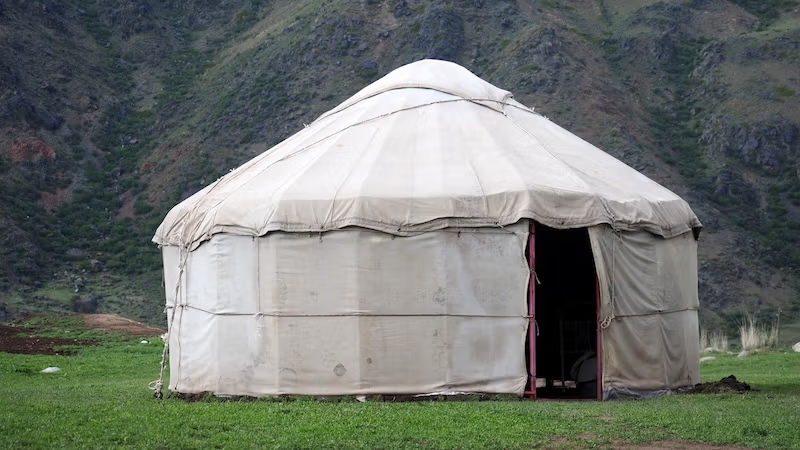
Safety, Animals & Weather Smarts
- Storms: If thunder pops, descend ridges, avoid lone trees and metal fences; layer up fast after rain.
- Dogs: Shepherd dogs guard; stay on your horse, keep calm and close to your guide—they’ll shoo dogs off.
- Horses: Kyrgyz horses are mountain pros. Keep heels down, reins steady, and trust their pace on scree.
- Hydration: Aim for 2–3L/day; supplement with electrolytes after hot or high days.
- Sun: UV at 3,000 m is fierce—reapply SPF often, and wear sunglasses + brimmed hat.
Leave No Trace (Tiny Habits, Big Impact)
- Pack out all trash (yes, even “biodegradable” fruit peels).
- Use outhouses; if not possible, dig a small cat-hole 70+ m from water.
- Keep to existing tracks to protect fragile alpine plants.
- Don’t feed wildlife; be respectful with livestock and corral gates.
- Buy local—homestays, crafts, and community tours directly benefit the families you’ll meet.
Add-On Ideas Around Bokonbayevo (Perfect Before/After the Trek)
- Bel Tam Yurt Camp: Lakeside yurts, bonfires, Issyk-Kul sunrise right from your bed.
- Skazka (Fairy-Tale) Canyon: Short hikes among red, wind-sculpted labyrinths—golden hour is magic.
- Eagle-Hunting Demo: Meet a berkutchi (eagle hunter) and learn the tradition; opt for an educational, ethical show.
- Salt Lake (Tuz-Kol): Float like the Dead Sea, rinse after with fresh water.
- Barskoon Gorge & Waterfalls: Picnic among spruce and spray with Soviet-era space-themed monuments along the road.
- Jety-Oguz (Seven Bulls): Day trip for striped red cliffs and a gentle valley walk.
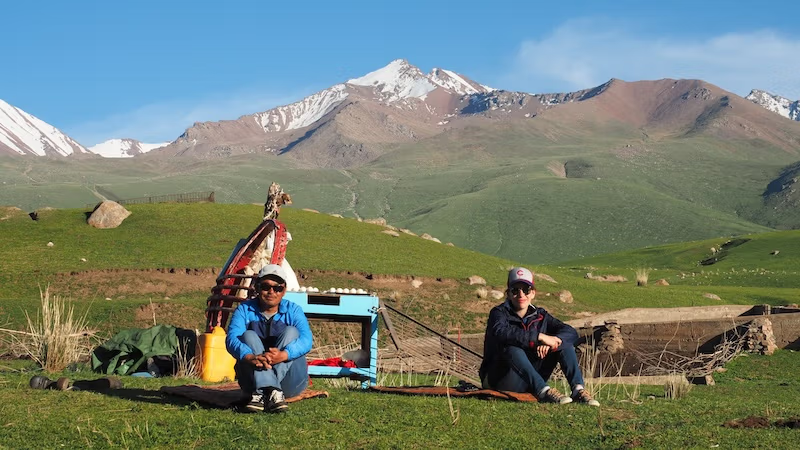
FAQ: Horse Trekking the Panorama Trail (12 Questions Answered)
How much riding experience do I need for the Panorama Trail?
You don’t need to be a pro. If you’re comfortable on a horse at a walk (and can follow simple instructions), you’ll be fine. The steepest sections can be done on foot while leading your horse—your guide will advise where it’s safer to dismount.
Can I do the trek if I’m prone to altitude sickness?
Most riders do well since you sleep lower than the 3,080 m pass. Spend a day or two acclimatizing around Issyk-Kul, hydrate constantly, pace yourself on the pass, and descend if you feel unwell. If you’ve had serious AMS before, consult a doctor and mention it to your guide.
What’s the bathroom situation like on the trail?
Expect outhouses at homestays and basic long-drop toilets at shepherd huts. On the trail, nature is your restroom—carry TP in a zip bag and use a hand-sanitizer after. Pack-out systems aren’t common; minimize impact and follow your guide’s lead.
Are helmets and riding gear provided?
It varies. Some operators can provide helmets on request; others expect you to bring your own. Closed-toe shoes with tread are essential. Ask about gear availability when booking and pack accordingly.
What are the horses like?
Sure-footed, small-to-medium Kyrgyz horses—stoic, gentle, and born for mountains. They respond well to calm riders with steady hands. Treat them kindly, give them space on steep terrain, and let them pick their path on rocky ground.
Is there mobile signal or Wi-Fi during the trek?
Signal appears sporadically on ridgelines and near towns, and disappears in valleys. Assume no Wi-Fi, limited charging, and embrace the digital detox. Bring a power bank and switch to airplane mode to stretch battery life.
How do I handle dietary restrictions with homestays?
Let CBT or your operator know when you book. Vegetarian is usually possible (eggs, potatoes, noodles, salads), but strict vegan/gluten-free require extra planning and backup snacks. Be gracious—rural families cook with what’s available.
What happens if the weather turns bad?
Mountain weather flips quickly. Your guide will adjust pace, break during heavy rain or hail, and choose safer routes. Layers and a proper rain shell make all the difference; never push speed on slick rock or muddy descents.
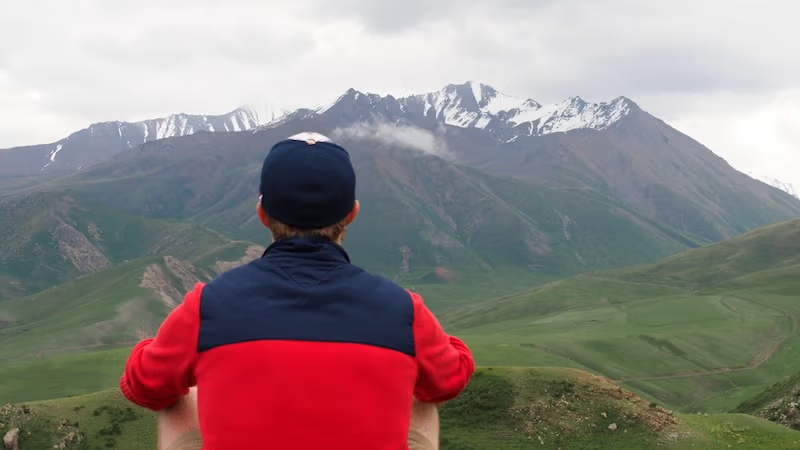
Can I store my main luggage during the trek?
Yes. Your Bokonbayevo guesthouse or CBT office typically stores extra bags safely. Take only a small duffel/daypack for the trek; the lighter, the happier your horse.
Are tips expected for guides and host families?
Tips aren’t mandatory, but they’re appreciated. A guideline is 10–15% of the trek cost for your guide/horse handler, and a modest cash gift or small presents for host families, especially after exceptional hospitality.
Is the Panorama Trail suitable for children?
Active kids and teens who are comfortable following instructions and spending a few hours outdoors daily can thrive here. Book a private trek so the pace fits your family, and consider shortening Day 2’s distance.
How do I book the trek locally if I don’t plan ahead?
Pop into CBT Bokonbayevo or Destination South Shore in town. They can often arrange guides and horses within a day, especially in summer, and help match you with a route that suits your time, fitness and budget.
Have you been trekking in Kyrgyzstan?
What were some of your favourite spots?
This trip was made possible in partnership with Discover Kyrgyzstan. As always, all opinions expressed here are my own.

Can’t believe these are the landscapes of Kyrgyzstan! I didn’t know it was so beautiful. Sounds like you guys had lots of fun trekking and exploring the nature.
I admit to knowing little about Kyrgyzstan but I’ve been hearing more about it lately from other bloggers (so whatever their tourism department is doing is working) and it looks incredible. This is definitely the type of trip I’d be up for. Must keep it on my radar.
Lately I am reading a lot of travel blog post from Kyrgyzstan, I am trying to figure out an option to travel wakhan corridor in Afghanistan. I need to know about how to obtain multiple entries for Kyrgyzstan so that I can cross the overland border out from Afghanistan.
Hi Pradeep, if you’re looking at doing the Wakhan Corridor I’d recommend these two articles by two friends of mine who’ve done it: How to visit the Wakhan by Expert Vagabond and The Complete Guide to the Wakhan by Backpacking Man. There’s some great info in both of these articles.
It looks absolutely beautiful! I’ve flown through Kazakhstan and visited Tajikistan, but I’ve never managed to get myself to Kyrgyzstan. Those landscapes and mountains are just so beautiful!
Hey Audrey! Great post and photos.I guess we had the same guide because I had the same dog on my horse trek! He was awesome. 🙂 I did a slightly different route and stayed with different families but I recognize the scenery in some of your photos.
Nice blog. I did from Kyzart Pass to Song Kol lake via Kilemche summer camp last year. The lush valleys and yurts around the mountains looked awesome.
What a great post to see. Its really looks beautiful. I love horse riding which make me this even interesting.
thanks for the blog post.
I’ve been to Kazaktan we back 2016 and we have a plan to go back there. I will include kyrgyzstan on our iterinary .